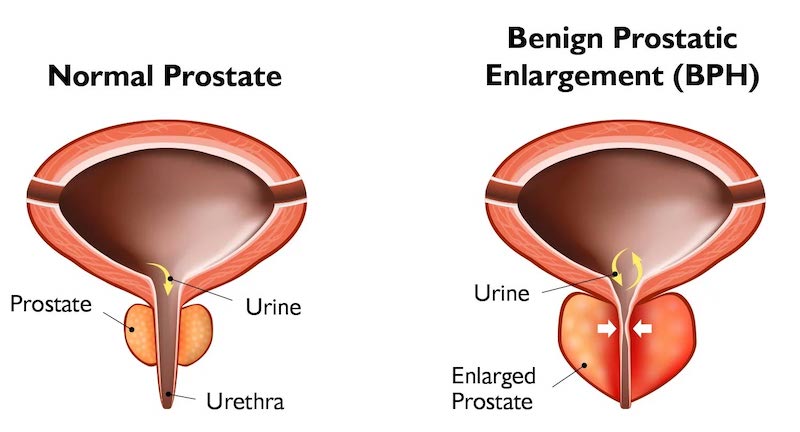Understanding the Importance of your Prostate
Many men do not understand what their prostate does and how it can impact their lives. The prostate is a small gland that is about the size and shape of a walnut that is located below the neck of the bladder. The urethra runs through the center of your prostate, from the bladder through the penis, letting urine flow out of the body.
Your prostate is a male reproductive organ. The main function of your prostate is to produce prostatic fluid. The prostatic fluid is an alkaline fluid secreted by the prostate gland during ejaculation that forms part of the semen.
Your prostate can become larger as you age, and usually begins to grow around the age of 40-50, this is a normal part of aging. Eventually, this growth can lead to Benign Prostatic Hyperplasia, better known as BPH.
What is BPH?
Benign Prostatic Hyperplasia, or BPH, is a condition in which the prostate enlarges as men get older. BPH is a very common condition that affects nearly 40 million Americans and over 500 million aging men worldwide. Over 40% of men in their 50s and over 70% of men in their 60s have BPH. While BPH is a benign condition and unrelated to prostate cancer, it can greatly affect a man’s quality of life.
As the prostate enlarges, it presses on and blocks the urethra, causing bothersome urinary symptoms such as:
- Frequent need to urinate both day and night
- Weak or slow urinary stream
- A sense that you cannot completely empty your bladder
- Difficulty or delay in starting urination
- Urgent feeling of needing to urinate
- A urinary stream that stops and starts
If you suffer from the above symptoms, you are not alone. BPH is the leading reason men visit a urologist.

What is the UroLift System?
Treatment with the UroLift® System is typically a one-time, in-office solution that provides rapid relief and recovery of BPH symptoms. It can break the cycle of medications and how they make a person feel, all without the risks of more invasive surgery. The goal of the UroLift System treatment is to relieve symptoms so you can get back to your life and resume your daily activities.
The UroLift System treatment has demonstrated a significant improvement in quality of life for patients compared to medications. The UroLift System is the only BPH procedure shown not to cause new and lasting erectile or ejaculatory dysfunction, while being a safe and effective treatment of lower urinary tract symptoms due to BPH.
How Does The UroLift System Work?
The UroLift System uses a revolutionary approach to treating BPH that lifts and holds the enlarged prostate tissue so it no longer blocks the urethra. It is the only BPH treatment performed by a urologist that does not require heating, cutting, or removal of the prostate tissue. The procedure is typically performed using local anesthesia in a physician’s office or ambulatory surgery center. Patients typically return home the same day without a catheter.
Benefits of the UroLift System include:
- Does not cause new onset, sustained erectile or ejaculatory dysfunction
- Minimally invasive
- Minimal downtime
- Durable results
- Rapid symptom relief and recovery
- Significant improvement in quality of life
As with any medical procedure, individual results may vary. Speak with your urologist to see if the UroLift System treatment is right for you. Most common side effects are mild to moderate and include pain or burning with urination, blood in the urine, pelvic pain, urgent need to urinate and/or the inability to control the urge. Most of these side effects resolve within two to four weeks after the procedure.
FAQ
Is BPH a type of cancer?
No, BPH (Benign Prostatic Hyperplasia) is a benign condition and unrelated to prostate cancer; however, it can greatly affect a man’s quality of life. BPH is NOT a type of cancer.
What happens when BPH is left untreated? Are there any long-term risks?
If left untreated, BPH can lead to permanent bladder damage. When the bladder does not empty completely, the risk of developing urinary tract infections (UTIs) may increase. Other serious problems can also develop over time, including bladder stones, blood in the urine, incontinence, or urinary retention.
When should I seek BPH treatment?
You may want to seek BPH treatment if you experience BPH symptoms such as urgent need to urinate, difficulty starting your urine stream, need to push or strain when urinating, dribbling, the sensation that the bladder is not empty after urinating, weak urine flow, increased frequency of urination, frequent nighttime urination, burning or pain during urination.
Who is a good candidate for the UroLift® System treatment?
You may be a good candidate if you are a male, 45 years of age or older, and have symptoms relating to BPH. Speak with your urologist to see if the UroLift System treatment is right for you. If you have a known allergy to nickel, titanium or stainless steel, talk to your doctor about your allergy before getting a UroLift System treatment.
How does the UroLift System work?
The UroLift System consists of a delivery device and tiny permanent implants.
- The UroLift Delivery Device is placed through the obstructed urethra.
- Small UroLift Implants are placed to lift or hold the enlarged prostate tissue out of the way. The Implants are delivered through a small needle that comes out of the delivery device and into the prostate.
- The UroLift Delivery Device is removed, leaving an open urethra that provides symptom relief.
One unique aspect of the UroLift System is that it does not preclude retreatment or BPH treatments such as TURP or laser, should they be required in the future.
What examinations do I need prior to the UroLift System treatment?
The examination performed will be determined by your physician. The physician will likely ask you to fill out a questionnaire to assess your symptoms, otherwise known as IPSS (International Prostate Symptom Score). Additionally, some of the common examinations include Digital Rectal Exam (DRE), Transrectal Ultrasonography (TRUS), Bladder Ultrasound, and Urinalysis.
What should I expect during the treatment? Is it painful? How long does it take?
If you and your doctor decide that the UroLift System treatment is right for you, your doctor will provide you with more detailed information relating to the treatment. In general, the UroLift System is a minimally invasive treatment that entails minimal downtime. Your doctor will use the UroLift Delivery Device to deploy permanent implants to relieve obstruction caused by the enlarged prostate that is pressing on your urethra. The procedure, which usually takes less than an hour, may be performed under local or general anesthesia and you may be given medication to feel comfortable during the treatment. This typically helps minimize discomfort during the procedure, though everyone’s definition for pain and discomfort varies greatly. Typically, no catheter and no overnight stay is required post-treatment.
What happens post-treatment, during the recovery period? Are meds required?
After the treatment, patients typically go home the same day without a catheter. There is minimal downtime post-treatment and many patients experience symptom relief in as early as 2 weeks. Patients may experience some urinary discomfort during the recovery period. The most common side effects may include blood in the urine, some pain or discomfort when urinating, some increased urge to go and discomfort in the pelvis that typically resolve within two to four weeks after the procedure.
Does the treatment affect my sexual function?
Clinical studies have shown the UroLift System treatment does not cause new, sustained instances of erectile or ejaculatory dysfunction. The same cannot always be said of other BPH therapies such as TURP, laser, and even medication.
Does my insurance cover the treatment?
The UroLift System treatment is covered by Medicare and many private insurers. Contact your insurance provider for your specific coverage information.
Please contact us at (304) 399-4651.




